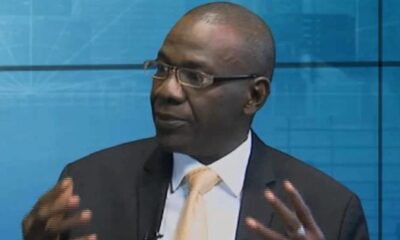Money market
Naira lost N35/$1 on P2P trading in 10 days
The Nigerian naira currency has fallen on Binance’s P2P trading platform due to the country’s deteriorating economy and drop in FDI.
The USDT/NGN pair traded at N737 to $1 on Saturday, compared to N702 on April 10. This marks a spread of N35 in just 11 days.
Like many emerging economies, Nigeria faces significant economic challenges that have led to the collapse of its currency. One of the major challenges is inflation.
According to the recent data, headline inflation rose to 22 per cent in March this year, with last month’s inflation rate rising by 0.13 per cent. Analysts caution that the actual inflation rate is likely higher than official figures.
Inflation in Nigeria is expected to continue to rise, as the new president vows to end energy subsidies, which have led to some of the lowest fuel prices in recent years.
Meanwhile, FDI has dried up amid global financial constraints, with foreign investors earning over a four per cent yield by purchasing short-term government bonds.
Recent data also suggest that FDI in Nigeria will decline to $5.3 billion in 2022, compared to $6.7 billion previously. This is due to the naira’s depreciation, weak government economic policies, and pre-election uncertainties.
The decline of the naira has significantly impacted Nigerian savers, who have seen their investments significantly lose value. Many Nigerians are turning to stablecoins as an alternative investment option to mitigate this.
Stablecoins are digital tokens that are designed to maintain a stable value relative to a specific asset, such as the US dollar. They are often used as a way to transfer value between cryptocurrencies, without being exposed to the price volatility that is typical of most cryptocurrencies.
For Nigerians, stablecoins offer a way to keep their money on track and their savings safe, while other cryptocurrencies and fiat currencies such as the naira experience significant price volatility. Examples of stablecoins include Tether (USDT), USD Coin (USDC), and Binance USD (BUSD), all of which are available on Binance.com.
Cryptocurrency exchanges allow users to buy, trade, and spend stablecoins, and some even offer interest on savings. This makes stablecoins an attractive alternative to traditional savings accounts, which offer low-interest rates that do not keep up with inflation.
In addition to offering protection against inflation, stablecoins also have a borderless feature that makes transactions easy and convenient, with very low transaction fees. They are open to all generations, including tech-savvy Nigerian youth, who are increasingly turning to digital assets as a way to invest and save.
Finally, stablecoins do not have a central authority that can breach payments, which provides an added layer of security for users. As more major brands embrace cryptocurrencies, digital users in Nigeria and worldwide have access to more locally and globally recognized brands.
Money market
Lagos, India to boost trade partnership


The Lagos Chamber of Commerce and Industry and the Confederation of Indian Industry have signed an agreement to boost trade partnership.
In a memorandum of understanding in Lagos on Tuesday, both parties observed that the agreement would enhance avenues for effective collaborations.
Lagos Chamber of Commerce and Industry Deputy President Knut Ulvmoen said that the partnership’s focus was to leverage the trade capacity of both parties.
Ulvmoen said that both parties would explore capacity in Information and Communication Technology, medical, training, agriculture, manufacturing and export, among others.
He acknowledged what he described as robust and enduring trade relations between Nigeria and India.
He noted that over the years, both nations had witnessed a steady growth in bilateral trade with significant contributions from various sectors.
“Today’s meeting serves as a platform to, not only strengthen the existing partnerships, but also to forge new alliances that will contribute to the sustainable growth and development of both nations.
“Together, we must seize this moment to identify synergies, exchange expertise, and explore innovative solutions to economic challenges.
“Let us leverage the collective wisdom of our industries to develop actionable strategies that will drive inclusive growth, foster entrepreneurship, and enhance competitiveness,” he said.
Indian High Commissioner Shri Balasubramanian expressed his belief in shared growth and prosperity by both countries.
He also emphasised the importance of Nigerian-Indian business collaboration.
Balasubramanian stated that the government of India was making efforts to build capacity in trade, seeking private sectors’ partnership to identify projects that could be profitable to the trade structure of both countries.
“The opportunities existing between both countries are enormous as more than 155 Indian companies in Nigeria employ many Nigerians.
“From oil to steel; to healthcare, we are willing to link Nigerians up with their counterparts in India as we explore avenues of collaboration and partnership,” he said.
Money market
Naira remains at N1,350 as CBN targets FX inflow for liquidity boost


The naira on Tuesday steadied at 1,350 per US dollar on the parallel market, popularly called black market.
On Monday morning, the naira opened the foreign exchange (FX) market at the same rate before closing at N1,360/$1 on the same day at the black market.
At the official market known as the Nigerian Autonomous Foreign Exchange Market (NAFEM), the naira on Monday fell to 1,419.11 per dollar, the lowest since March 13, 2024 at the official FX market, following slowing inflows occasioned by the withdrawal of funds by Foreign Portfolio Investors (FPIs).
The intraday high closed at N1,451 per dollar on Monday, weaker than N1,410 closed on Friday. The intraday low also depreciated marginally to N1,060 on Monday as against N1,051/$1 closed on Friday at NAFEM, data from the FMDQ Securities Exchange indicated.
Dollars supplied by willing buyers and willing sellers declined by 52.16 percent to $147.83 million on Monday from $309.01 million recorded on Friday.
On day to day trading, the naira weakened by 5.63 percent as the dollar was quoted at N1,419.11 on Monday as against N1,339.23 quoted on Friday at NAFEM.
During the recent Monetary Policy Committee (MPC) meeting, Governor of the Central Bank of Nigeria (CBN), Olayemi Cardoso, emphasised the critical need to attract inflows to maintain liquidity in the foreign exchange market and stabilize the exchange rate.
In his statement, Governor Cardoso highlighted the importance of addressing inflationary pressures through exchange rate management to safeguard both price stability and long-term economic growth.
“Failure to tame inflationary pressure using the exchange rate channel may jeopardise not only price stability but also long-term growth,” stated Governor Cardoso.
Addressing concerns raised at the March 2024 MPC meeting, Governor Cardoso emphasised the need to reduce negative real interest rates to attract capital flows and enhance liquidity in the FX market. He stressed the significance of attracting capital flows through foreign portfolio investments and moderating exchange rate pressures to mitigate the impact of exchange rate pass-through on inflation, particularly in Nigeria’s import-dependent economy.
Commenting on the monetary situation, Mustapha Akinkunmi highlighted a decline in Nigeria’s reserve money by 24.91 percent to approximately N22.2 trillion by the end of February 2024. Despite this, broad money (M3) supply increased to N93.7 trillion, contributing to inflationary pressures. Nigeria’s external reserves also decreased to US$32.87 billion as of March 19, 2024, from US$33.68 billion in February 2024.
Although current reserves cover imports for 5.7 months of goods only and 4.5 months of goods and services, the country’s ability to repay short-term debts using reserves exceeded the threshold at 104.0 percent, he said.
According to him, the reserves-to-broad money ratio of 33.1 percent surpassed the 20.0 percent threshold, indicating Nigeria’s capacity to manage capital flows effectively.
Governor Cardoso’s emphasis on attracting inflows and managing exchange rate pressures underscores the CBN’s commitment to maintaining stability in the FX market and combating inflationary challenges in Nigeria’s economy.
Money market
Mobile channel most vulnerable, as financial institutions lose N17.67bn to fraudsters in 2023


Latest report by the Nigeria Inter-Bank Settlement System (NIBSS) on Annual Fraud Landscape (January to December 2023) has revealed that commercial banks, Point of Sales (PoS) operators and others lost about N17.67 billion to fraudsters in 2023.
The report published on its website on Monday identified mobile channels as the most vulnerable avenue for fraudsters notably Web and POS businesses.
The report noted that fraud perpetrated via mobile channels increased by five percent compared to the previous year.
It also suggested some of the regulations inputted to check fraud in financial institutions need detailed examination, modification and reinforcement.
According to the statistics revealed by the report, fraud count dropped by six percent to 95,620, as actual loss from fraud grew by 23 percent in 2023 when compared to 2022 with the first quarter being the month with the highest fraud volume in 2023 and the fourth quarter being the month with the highest fraud value.
It also disclosed that the month of May recorded the highest fraud count of 11,716, followed by February with 9,492 while October saw the highest actual loss in 2023 at N3.7 billion, followed by January with N2.7 billion. It said the count of Web Fraud decreased by 38 percent and ATM fraud recorded a 64 percent reduction from 2022 to 2023.
Also, in 2023, people aged 40 and above remained the primary targets of fraudsters, which NIBSS said signified a persistent focus on the targeting strategy of fraudsters.
“This sustained trend emphasises the enduring appeal of the demographic group as potential victims, reinforcing the need for continuous efforts to educate and protect individuals in this category from fraudulent activities,” NIBSS said.
In 2023, a total of 80,658 unique customers fell for the gimmicks of fraudsters which is four per cent less than 84,130 customers recorded in the previous year.
“This decline, though apparent, does not diminish the severity of the issue, urging the financial industry to remain vigilant, enhance security measures and collaboratively address the tenacious challenges posed by fraud,” it said.
-
capital market2 years ago
Rt.briscoe, FBNH, Others halts negative performance of stock market
-
Finance3 months ago
Court orders Sen. Victor Umeh to repay N136m bank debt to AMCON
-



 Abuja Update2 months ago
Abuja Update2 months agoUNDP, FG partnership needed to achieve inclusion, equity- Minister
-
Abuja Update1 month ago
Banks drive stock market performance with N147bn gain
-



 Business1 week ago
Business1 week agoTingo Group unveils Tingo Electric, Tingo Cola drink at Lagos launch
-



 Health2 weeks ago
Health2 weeks agoCapacity training will reduce migration of health workers- NPHCDA
-
News4 months ago
Oil thieves sponsoring malicious media campaign against Navy – Spokesman
-



 Infotech1 month ago
Infotech1 month agoWorld Backup Day: NITDA urges Nigerians to ensure backup of data













